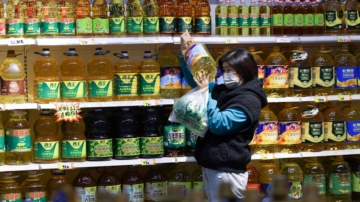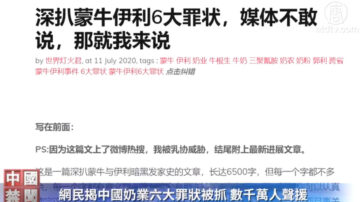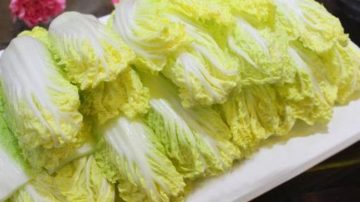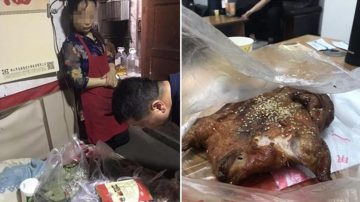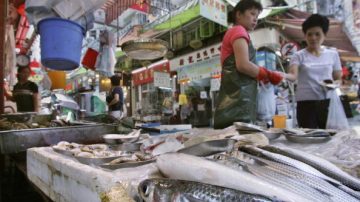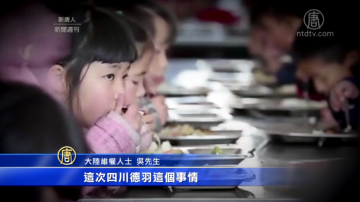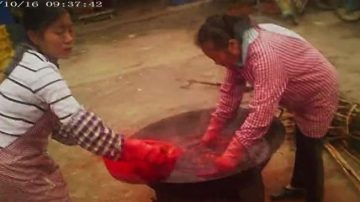【新唐人2013年08月07日讯】全球最大乳制品加工企业新西兰“恒天然集团”,爆出浓缩乳清蛋白粉产品可能含肉毒杆菌之后,新西兰当局宣布全球召回1000吨可能遭到污染的乳制品,8月6号派政府官员进驻“恒天然”,以确保肉毒杆菌污染事件信息公开。虽然中共喉舌藉机大肆宣传,这是中国奶粉翻身的机会,但中国消费者对国产奶粉还是不放心。对比发生同样的毒食品事件,外国企业主动公布丑闻,政府出面监督,而中共当局是极力掩盖,监管不力,造成毒食品事件层出不穷,大陆很多民众认为,这不仅是道德问题更是国家体制问题。
新西兰经济发展部长乔伊斯8月6号表示,新西兰政府官员已经进驻恒天然在新西兰以及澳大利亚的办公地点。他说,这是保证恒天然就肉毒杆菌污染事件提供确切的信息。
全球乳业龙头新西兰乳制大厂“恒天然”,8月2号爆出约有40万吨乳清蛋白原料可能受肉毒杆菌污染。影响包括3家中国企业在内的8家客户。
5号,恒天然集团(Fonterra)的首席执行长西奥‧史毕根斯,在北京举行记者会,向大陆及受影响地区消费者公开道歉,并表示已经确认市场上90%受影响产品的安全状况,剩下10%的产品将在48小时内召回。
西奥‧史毕根斯一开口就是道歉,他还特地提到中国,因为中国大陆上半年的进口奶粉,新西兰就占了83.3%。
新西兰总理约翰‧基(John Key)同一天也在电视节目中做了道歉,同时对今后新西兰奶业出口情况表示担忧。另外,新西兰政府也任命60名官员处理这次事件,提供最新消息给社会大众知道。
时事评论员邢天行:“至少老百姓看到了,海外的问题,一般都是厂家自己在检测当中,马上开始采取应变措施,一个是真诚的道歉,第二个回收,还有一个就是,一般来讲,他们是自己检查出来的就会公布的,为了防止对人体产生危害,他们不会有意的去掩盖甚么。”
虽然中共媒体藉机大肆宣传,这是中国奶粉翻身的好机会,并鼓励国人多购买国产奶粉。中共喉舌《新华社》也发表评论,表明食品安全问题中外皆有,民众不该迷信国外奶粉。
对于这些宣传,民众却不买帐。有网友说,国外奶粉都是预防性召回,国内奶粉得吃死人了才会报导。网友“模范二哥”说,外国奶粉被污染,是监管不严,相当于“过失杀人”。国内奶粉人为添加三聚氰胺,是故意为之,相当于“故意杀人”。
时事评论员邢天行:“不管中共怎么宣传外面的质量怎么差,实际上都不可能改变中国民众对海外奶粉的购买热情。三鹿之后,我们也知道毒奶粉问题仍然没有得到解决,而且有毒的东西更在增加,所以就可以看出来,总体来讲,中国民众越清醒的认识到,中国的质量问题是中共这个体制造成的。”
从网络上的反应看,中国家长对国产婴儿配方奶粉依旧缺乏信任。网民“MISS冯妈妈”微博发言说:中国人就会搞舆论,贬低国外奶粉从而提升国内奶粉,可是,国内奶粉只知道瞒天过海,哪个妈妈相信国内奶粉?
大陆民众田女士:“国外他这种监督机制比较健全,检测人员比较负责任,一旦有问题他都会主动去爆光这样的事,不像中国有问题要捂着掩着不让老百姓知道,我们当初生小孩在一个病房里,很多妈妈都说绝对不买国内奶粉,我们一直是在网上的国际妈咪代购,直接从国外买奶粉。”
2008年,中国毒奶粉事件的曝光,据了解是“恒天然”率先发现三鹿添加三聚氰胺的问题,并呈报给新西兰政府,从而让公众了解了这一事件。之后,中国民众就不敢给婴幼儿喝国产奶了。
采访/田净 编辑/黄亿美 后制/郭敬
Contaminated Milk Exposed in New Zealand
Fonterra Group is the world's largest dairy
processing enterprise, from New Zealand.
Recently, their concentrated whey protein
powder products were suspected to contain
Clostridium botulinum, which causes Botulism.
New Zealand authorities announced a
global recall of 1,000 tons of dairy products.
On August 6, officials were stationed at Fonterra to
ensure information was disclosed on the contamination.
Chinese Communist Party (CCP) state media took
the opportunity to extol the benefits of Chinese milk.
However, Chinese consumers
still do not trust domestic milk.
When food poisoning incidents occur,
foreign companies announce the incident.
The foreign governments also supervised it.
However, Chinese authorities are always trying to cover
up these incidents, and do not supervise investigations.
This has resulted in repeated food poisoning incidents.
Many people believe that it is not only a moral
issue, but also a national institutional issue.
The New Zealand Economic Development
Minister Stephen Joyce commented on August 6.
New Zealand government officials have been stationed
Fonterra office locations in New Zealand and Australia.
He said that this is to ensure Fonterra provide precise
information on Botulism contamination events.
Leading global dairy plant Fonterra first released news
on August 2 that about 400,000 tons of whey protein
materials may be affected by Clostridium botulinum.
This impacts eight clients, with
three being Chinese enterprises.
Fonterra Chief Executive Theo Wiggins held
a press conference in Beijing on August 5.
He publicly apologized to China and other affected
areas, and said it had confirmed that 90% of the
affected products in the market are now secure.
The remaining 10% will be recalled within 48 hours.
Theo Wiggins apologized, and specifically mentioned China.
In the first half of the year, 83.3% of imported
milk powder in China was from New Zealand.
New Zealand Prime Minister
John Key was interviewed on TV.
He apologized on the same day news was released, and
expressed concern for the future New Zealand dairy exports.
In addition, the New Zealand government also
appointed 60 officials to deal with the incident,
and to provide updated information to the public.
Xing Tianxing, Commentator: "At least Chinese
people saw that issues with products overseas were
generally detected by manufacturers themselves.
They immediately began to implement contingency
measures, sincerely apologized, and recalled products.
Once they had detected the problems, they
publicized it to prevent harm to people.
They do not intend to hide anything."
However, CCP state media took the opportunity to
discuss the benefits of using Chinese milk products.
It encouraged people to purchase domestic milk. CCP
state controlled Xinhua News Agency also commented.
Food safety issues exist in foreign and domestic markets,
and people should not blindly trust foreign milk products.
Chinese people did not believe in the propaganda.
Some netizens said that this incident with foreign
milk powder had a preventive recall on products.
Domestic milk incidents are only
reported when someone dies from it.
Netizen "Model Brother" said that the foreign milk
powder contamination is due to lack of supervision.
This is equivalent of negligent homicide.
Chinese domestic milk had Melamine artificially added,
which is intentional, and equivalent to intentional homicide.
Xing Tianxing: "It doesn't matter how CCP propaganda
suggests the quality of overseas products are poor.
They cannot change Chinese people's
enthusiasm for buying overseas milk.
After the Sanlu incident, we also know that
poisonous milk problems are still not resolved.
Toxic ingredients were increasingly used.
Generally speaking, the Chinese people have
become more aware that China's product quality
problems were caused by the CCP system."
From indications on the internet, parents in
China still do not trust domestic infant formula.
Netizen "Miss Feng" commented in a microblog.
Chinese people can only engage in public opinion, which
disrespects foreign milk, and promotes domestic milk.
However, domestic milk quality problems are
covered up, so which mother trusts domestic milk?
Miss Tian: "Foreign monitoring mechanisms are
comprehensive. Testing personnel are responsible.
Once a problem is revealed, they
take the initiative to expose it.
This is not like China, where it is covered up.
In the hospital room after giving birth, many mothers
said they would not buy domestic milk powder at all.
They always been buying online
from international suppliers abroad."
In 2008, the Chinese milk scandal was exposed.
It is known that Fonterra first discovered the
problem of Melamine in Sanlu milk powder.
It reported this to the New Zealand government,
and allowed the public to know about it.
The Chinese people did not dare drink
Chinese produced infant milk from then on.
新西兰经济发展部长乔伊斯8月6号表示,新西兰政府官员已经进驻恒天然在新西兰以及澳大利亚的办公地点。他说,这是保证恒天然就肉毒杆菌污染事件提供确切的信息。
全球乳业龙头新西兰乳制大厂“恒天然”,8月2号爆出约有40万吨乳清蛋白原料可能受肉毒杆菌污染。影响包括3家中国企业在内的8家客户。
5号,恒天然集团(Fonterra)的首席执行长西奥‧史毕根斯,在北京举行记者会,向大陆及受影响地区消费者公开道歉,并表示已经确认市场上90%受影响产品的安全状况,剩下10%的产品将在48小时内召回。
西奥‧史毕根斯一开口就是道歉,他还特地提到中国,因为中国大陆上半年的进口奶粉,新西兰就占了83.3%。
新西兰总理约翰‧基(John Key)同一天也在电视节目中做了道歉,同时对今后新西兰奶业出口情况表示担忧。另外,新西兰政府也任命60名官员处理这次事件,提供最新消息给社会大众知道。
时事评论员邢天行:“至少老百姓看到了,海外的问题,一般都是厂家自己在检测当中,马上开始采取应变措施,一个是真诚的道歉,第二个回收,还有一个就是,一般来讲,他们是自己检查出来的就会公布的,为了防止对人体产生危害,他们不会有意的去掩盖甚么。”
虽然中共媒体藉机大肆宣传,这是中国奶粉翻身的好机会,并鼓励国人多购买国产奶粉。中共喉舌《新华社》也发表评论,表明食品安全问题中外皆有,民众不该迷信国外奶粉。
对于这些宣传,民众却不买帐。有网友说,国外奶粉都是预防性召回,国内奶粉得吃死人了才会报导。网友“模范二哥”说,外国奶粉被污染,是监管不严,相当于“过失杀人”。国内奶粉人为添加三聚氰胺,是故意为之,相当于“故意杀人”。
时事评论员邢天行:“不管中共怎么宣传外面的质量怎么差,实际上都不可能改变中国民众对海外奶粉的购买热情。三鹿之后,我们也知道毒奶粉问题仍然没有得到解决,而且有毒的东西更在增加,所以就可以看出来,总体来讲,中国民众越清醒的认识到,中国的质量问题是中共这个体制造成的。”
从网络上的反应看,中国家长对国产婴儿配方奶粉依旧缺乏信任。网民“MISS冯妈妈”微博发言说:中国人就会搞舆论,贬低国外奶粉从而提升国内奶粉,可是,国内奶粉只知道瞒天过海,哪个妈妈相信国内奶粉?
大陆民众田女士:“国外他这种监督机制比较健全,检测人员比较负责任,一旦有问题他都会主动去爆光这样的事,不像中国有问题要捂着掩着不让老百姓知道,我们当初生小孩在一个病房里,很多妈妈都说绝对不买国内奶粉,我们一直是在网上的国际妈咪代购,直接从国外买奶粉。”
2008年,中国毒奶粉事件的曝光,据了解是“恒天然”率先发现三鹿添加三聚氰胺的问题,并呈报给新西兰政府,从而让公众了解了这一事件。之后,中国民众就不敢给婴幼儿喝国产奶了。
采访/田净 编辑/黄亿美 后制/郭敬
Contaminated Milk Exposed in New Zealand
Fonterra Group is the world's largest dairy
processing enterprise, from New Zealand.
Recently, their concentrated whey protein
powder products were suspected to contain
Clostridium botulinum, which causes Botulism.
New Zealand authorities announced a
global recall of 1,000 tons of dairy products.
On August 6, officials were stationed at Fonterra to
ensure information was disclosed on the contamination.
Chinese Communist Party (CCP) state media took
the opportunity to extol the benefits of Chinese milk.
However, Chinese consumers
still do not trust domestic milk.
When food poisoning incidents occur,
foreign companies announce the incident.
The foreign governments also supervised it.
However, Chinese authorities are always trying to cover
up these incidents, and do not supervise investigations.
This has resulted in repeated food poisoning incidents.
Many people believe that it is not only a moral
issue, but also a national institutional issue.
The New Zealand Economic Development
Minister Stephen Joyce commented on August 6.
New Zealand government officials have been stationed
Fonterra office locations in New Zealand and Australia.
He said that this is to ensure Fonterra provide precise
information on Botulism contamination events.
Leading global dairy plant Fonterra first released news
on August 2 that about 400,000 tons of whey protein
materials may be affected by Clostridium botulinum.
This impacts eight clients, with
three being Chinese enterprises.
Fonterra Chief Executive Theo Wiggins held
a press conference in Beijing on August 5.
He publicly apologized to China and other affected
areas, and said it had confirmed that 90% of the
affected products in the market are now secure.
The remaining 10% will be recalled within 48 hours.
Theo Wiggins apologized, and specifically mentioned China.
In the first half of the year, 83.3% of imported
milk powder in China was from New Zealand.
New Zealand Prime Minister
John Key was interviewed on TV.
He apologized on the same day news was released, and
expressed concern for the future New Zealand dairy exports.
In addition, the New Zealand government also
appointed 60 officials to deal with the incident,
and to provide updated information to the public.
Xing Tianxing, Commentator: "At least Chinese
people saw that issues with products overseas were
generally detected by manufacturers themselves.
They immediately began to implement contingency
measures, sincerely apologized, and recalled products.
Once they had detected the problems, they
publicized it to prevent harm to people.
They do not intend to hide anything."
However, CCP state media took the opportunity to
discuss the benefits of using Chinese milk products.
It encouraged people to purchase domestic milk. CCP
state controlled Xinhua News Agency also commented.
Food safety issues exist in foreign and domestic markets,
and people should not blindly trust foreign milk products.
Chinese people did not believe in the propaganda.
Some netizens said that this incident with foreign
milk powder had a preventive recall on products.
Domestic milk incidents are only
reported when someone dies from it.
Netizen "Model Brother" said that the foreign milk
powder contamination is due to lack of supervision.
This is equivalent of negligent homicide.
Chinese domestic milk had Melamine artificially added,
which is intentional, and equivalent to intentional homicide.
Xing Tianxing: "It doesn't matter how CCP propaganda
suggests the quality of overseas products are poor.
They cannot change Chinese people's
enthusiasm for buying overseas milk.
After the Sanlu incident, we also know that
poisonous milk problems are still not resolved.
Toxic ingredients were increasingly used.
Generally speaking, the Chinese people have
become more aware that China's product quality
problems were caused by the CCP system."
From indications on the internet, parents in
China still do not trust domestic infant formula.
Netizen "Miss Feng" commented in a microblog.
Chinese people can only engage in public opinion, which
disrespects foreign milk, and promotes domestic milk.
However, domestic milk quality problems are
covered up, so which mother trusts domestic milk?
Miss Tian: "Foreign monitoring mechanisms are
comprehensive. Testing personnel are responsible.
Once a problem is revealed, they
take the initiative to expose it.
This is not like China, where it is covered up.
In the hospital room after giving birth, many mothers
said they would not buy domestic milk powder at all.
They always been buying online
from international suppliers abroad."
In 2008, the Chinese milk scandal was exposed.
It is known that Fonterra first discovered the
problem of Melamine in Sanlu milk powder.
It reported this to the New Zealand government,
and allowed the public to know about it.
The Chinese people did not dare drink
Chinese produced infant milk from then on.

